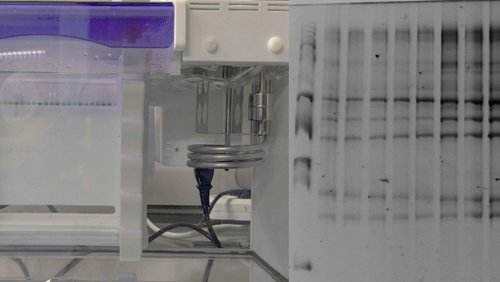Investigation of microbial biocoenoses under the influence of hydrogen and synthesis gas
Use of DGGE analysis

As part of our EcoPik research project, we are investigating the effects of hydrogen and synthesis gas on microbial biocoenoses in anaerobic digestion sludge. The aim is to use molecular biological methods to gain a better understanding of how these alternative gas substrates affect the composition and stability of bacterial and archaeal communities. To this end, we use denaturing gradient gel electrophoresis (DGGE), a technique that allows genetic diversity within microbial communities to be visualised. Genetically different microorganisms can thus be visualised in the gel within complex communities on the basis of varying DNA melting points, which are based on the composition and sequence structure. We use 16S and mcra genes as markers. The mcra gene is found in methane-producing microorganisms and is used to differentiate between functional groups.
The analyses show that, despite the addition of hydrogen or synthesis gas, the biocoenoses exhibit only moderate changes in continuously and statically operated experimental setups. Overall, the DGGE profiles indicate that the microbiological community appears to be able to adapt well to changing substrate conditions. These results provide valuable insights for the optimisation of biotechnological processes, especially in the field of biogas production.
Funded by the Federal Ministry for Economic Affairs and Climate Protection on the basis of a resolution of the German Bundestag.
![[Translate to Englisch:] Placeholder](/fileadmin/_processed_/f/4/csm_Header_Presse_d565a61df7.jpg)